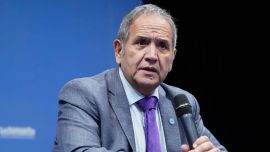In less than 10 hours, United States Secretary of the Treasury Scott Bessent burst the bubble of illusion which Argentina’s economic team had blown since the previous Friday with the announcement of a new agreement with the International Monetary Fund (IMF) and lifting the ‘cepo’ currency and capital controls.
Bessent, the top economic authority under US President Donald Trump, arrived empty-handed. Although he reiterated his support for President Javier Milei’s measures, he also conditioned the country with the rules imposed in the trade war with China, a reciprocity agreement and proposed a possible end to the currency swap with the Asian giant. Within government offices, the biggest bet was on investments but the private sector first wants to see in order to believe.
The first activity for the Treasury chief during his visit to Buenos Aires was a lunch with business leaders at the US Embassy’s Palacio Bosch residence. This was closed to the press and included no announcements with the aim of “showing US support” for the measures of Milei’s La Libertad Avanza administration.
Perfil was able to ascertain that the representatives of the private sector took advantage of the occasion to raise their doubts – many were related to energy investments, the area to which some of those present that noon are dedicated.
Participating in the meeting were, among others, AES Argentina CEO Martín Genesio, AmCham Vice-President Mariana Schoua, Pampa Energía owner Marcelo Mindlin andPierpaolo Barbieri, the founder of the Ualá digital bank. The latter, the tech unicorn, knows Bessent from before – the Soros fund was one of the first to invest in the virtual wallet.
AmCham president Alejandro Díaz sent a thank-you letter at the end of the lunch. “Your efforts to foster a constructive dialogue with the IMF have contributed significantly to the aim of promoting macro-economic stability and re-establishing investor confidence,” it highlighted.
At around 2pm, Bessent arrived at the Economy Ministry to meet Luis Caputo, the head of the portfolio. Extreme security measures were put in place – the part of Yrigoyen street linking the Ministry to the Casa Rosada was totally blocked, as were the accesses to the entire fifth floor of the building.
At 2.50pm, Bessent had crossed the short distance to Government House by car to record a joint statement. Just half an hour later, Milei walked across the Plaza de Mayo into the Economy Ministry where – together with his economic team – celebrations were staged and songs were played as they hailed the end of the cepo.
“The meeting was very, very good,” said one of Caputo’s secretaries at the door of the minister’s office. That was at the same time that the US Treasury secretary was giving an interview to Bloomberg news agency, during which he shattered the government’s illusions of a unilateral fresh credit line for Argentina from Washington.
“That is not under consideration,”Bessent responded during the interview when asked, despite reiterating his support and praising the “triple adjustment” being carried out by Milei amid the global trade war.
The US Treasury secretary also warned that the government should cancel its massive currency swap with China.
“They have a credit currency swap of US$18 billion in yuans. Argentina, under the previous Peronist government, obtained US$5 billion and that sum will remain pending. The Chinese made a big effort after or along with the IMF announcement and will extend it for a year. I believe that to the degree this administration maintains its inflexible economic policy, they should have sufficient currency inflow to be able to pay them off,” he pointed out.
Bessent conditioned US support on the government getting rid of the currency swap, which accounted for over half the gross reserves of the Central Bank before the IMF money arrived.
There were no announcements, neither in the US Treasury communiqués nor those of the US Embassy, nor in the joint statement with the Argentine president in a communication identical to the US style. There they trusted in lifting the exchange restrictions giving rise to “what should be a massive boom of foreign direct investment.”
“Many US firms with which I have spoken are enthusiastic about providing long-term capital to form part of this economic miracle,” affirmed Bessent.
"The state exists to serve the people and not vic- versa. This has been the intuition of presidents Milei and Trump for years. That is the reason why they lead two of the greatest countries in the Western Hemisphere. Under President Milei’s leadership, Argentina and the United States share similar values, which gave me the enthusiasm to make this trip to start the first formal conversations about trade reciprocity between our two countries," assured Bessent in his joint statement with Argentina’s leader.
The business sector hastened to throw its support behind the modifications of the dollar regime last Friday, but doubts persist.
“There is no elimination. They’re opening up a bit to ease imports but nothing to heat up the currency in terms of overdue debt stocks, whether commercial or for dividends. They do not believe they have the dollars to fund that,” a law office attending major foreign trade companies told Perfil.






















Comments